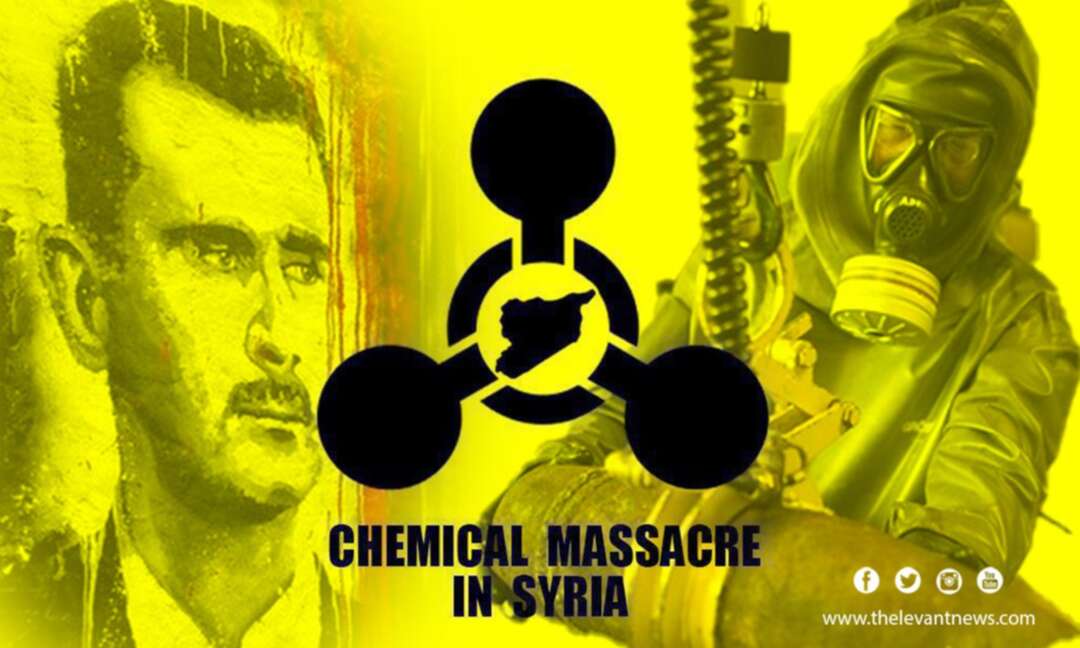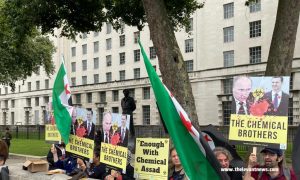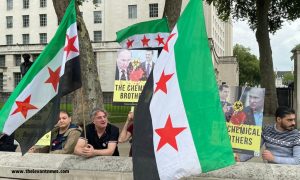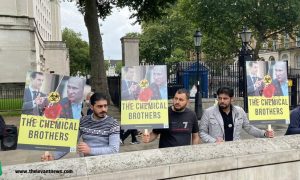-
On the anniversary of the Ghouta chemical attack ... electronic demonstration was held to tell about the Syrian cause ... No to impunity

Eight years later, the chemical massacre committed by the Syrian regime in Eastern Ghouta, on August 21, 2013, remains fresh in the people's minds. This anniversary commemorates this massacre and its 1,127 victims and offer condolences to more than 5,935 injured back then -as stated by the Syrian Network for Human Rights- and reminds that the criminal will not get away with his crimes, as long as the right is claimed.
On the anniversary of the chemical massacre, a group of Syrian activists, journalists, and human rights defenders held an electronic demonstration 'so to speak' using the Clubhouse platform to tell about the Syrian cause to other nations hopefully they would put pressure on their governments to punish that tyrant.
Levantnews covered the commemoration of the chemical massacre and the campaign held for it on the Clubhouse platform and met with a number of the organizers who led the campaign.
Dr Fayez al-Basha, one of the participants in the campaign, told Levantnews: “To commemorate the tragic anniversary of the August 21 chemical massacre which claimed about 1,400 lives -most of them were children and innocent women-, we suggested to make the profile pictures of the rooms similar. The profile pictures are yellow colour and in the middle a person holding a sign saying al-Assad next to the symbol of Nazism. The logo relates Bashar al-Assad to Nazism and the yellow colour which stands for 'the chemical attack'.
 demonstrations.. london
demonstrations.. london'Everyone changed the profile picture. We are about 100 participants now, with the same profile picture. We chose English and German political and social rooms in addition to the rooms of the Arab brothers from Egypt, Lebanon, and the Gulf states. Some were afraid that 100 yellow photos enter the room lest they would sabotage it. We sent them messages and explained that we are sending a humanitarian message, so we ask them to allow us to make a light or a picture message, to stand for 30 seconds and allow someone to speak.”
'Some were allowing more than 6 people and offering us greetings and condolences. Often only one person talked about the humanitarian message, the great tragedy, the real numbers, the documented news and the real references and sources,' he explained.
Nawwar Alyo, a media activist who participated in the campaign, told Levantnews that: 'As Syrians who live abroad, the only thing we can do to denounce what happened and is still happening until this moment is through demonstrations in front of embassies and in social media. However, these demonstrations have not been able to be heard by the international community.'
The electronic demonstration was not to lament but to show how the Syrians were let down. Alyo said the campaign launched by Mr Sakher Idris, advisor Ibrahim Al-Hajji, Dr Fayez Al-Basha, and some activists and journalists showed us how much the Syrian cause has not been promoted and told about. As a result, Alyo says: 'The work went on for hours last Saturday night to ensure our voice is heard to as many people as possible.'
 demonstrations.. london
demonstrations.. london'The team organized itself. The activists chose a number of speakers of foreign languages, such as English and German. We entered the spaces to explain the Syrian pain through the similar profile pictures in addition to the voice of the speaker. We politely entered the spaces in the Clubhouse and Twitter and gave a brief explanation of the massacre,' Alyo added.
'The campaign did not only introduce the Syrian pain but also we asked to spread the already-agreed hashtags,' Alyo added
'Using the spaces was not to lament, but rather to show how much our martyrs are let down. As well, we wanted to tell that our dear martyrs are not just numbers,' Alyo ended.
No to impunity
Sakher Idris, a Syrian journalist and human rights activist, said to Levantnews: 'Our goal is to use all social media to raise awareness of the Syrian cause. A definition of the cause was made and written in the bio instead of entering personal files and groups.'
It was written in the bio: '(Assad’s Holocaust)... On this day August 21, 2013, Bashar al-Assad’s forces launched a chemical attack against civilians in the eastern Ghouta outside Damascus. The attack claimed 1,350 civilians. A 2016 United Nations investigation showed that the Syrian regime is responsible for the chemical attacks against civilians in Eastern Ghouta. What do we want? We call on the international community to punish the criminals and not let them get away with their crimes.”
The bio was attached with other hashtags for more information, such as: #Do_Not_Suffocate_Truth .. #Assad's_Holocaust #Chemical_Assad .. #Chemical_Inhalation
'The campaign launched by a some online activists confirmed the criminals must not get away with their crimes. Organising the campaign was very important. We appointed a manager for the campaign and tasks were allocated systematically to achieve the intended goals,' Sakher says.
'The campaign has fulfilled its purpose. Some rooms have changed profile pictures in support of the Syrian cause and the electronic demonstration,' Sakher added.
Sakher mentioned that one of the English rooms which is dedicated to finding friends who speak the languages spoken in the Americas and has 150 foreign members from about 8 American countries sympathized with the Syrian cause especially the Ghouta chemical attack which they heard about for the first time through the definition mentioned in the bio.
The ethnicities (whether a Kurd, an Arab, an Assyrian ....) were not known because of the similar profile pictures.
Sakher mentioned that the Lebanese journalist Ghadi Francis, which is a supporter of the Syrian regime, was in one of the foreign rooms, and she was trying to interfere while the group was introducing the Syrian cause and the chemical attack, but she was banned by the administrator who said he did not know that she was a supporter of al-Assad and he spoke to some people to make sure of this.
Dr Fayez Al-Basha gave more details about the issue of Ghadi Francis. He told the administrator in the foreign room that there was a woman who supports Bashar al-Assad, it is Ghadi Francis. The administrator was against holding the campaign or entering the room or even getting involved in the issue but later he agreed on holding the campaign and said he does not know there are supporters of the killing and the chemical attack and then he blocked her.
 demonstrations.. london
demonstrations.. londonAl-Basha believes that the campaign was completely successful. The Egyptians love the campaign and called it great. As well, they started a room and called it 'Syrians make it and Egyptians still complain,” blaming themselves and complementing the Syrian collaborative efforts.
Al-Basha stated that female participation was very active in this collaborative work like Mrs Dima al-Sayyed. As well, he wished the journalist Mr Shiyar Khalil could have participated in the campaign. Al-Basha praised Mr Wael Al-Kurdi, who was active and was moving from a room to another. All the campainers were from different Syrian ethnicities but they worked as one.
'We could not know because of the similar profile pictures who is a Kurd, an Arab, an Assyrian, a liberal or a religious Muslim. I believe we have to go beyond our differences. I call for supporting this move and spreading it,' Al-Basha ended.
Duna al-Zaim, one of the organisers, confirms: 'The Syrian people are still proving their revolutionary stances and not forgetting the crimes of the Syrian regime against them as a people whose freedom, their basic right, has been stolen from them.'
'It is worth mentioning that the electronic campaign which took place on the Clubhouse application on August 12 draw the international community’s attention to what is happening in Syria. The campaign came at the same time as the Syrian regime continues committing violations against the Syrian people's necessities of life and as its crimes of burning the bodies of former detainees are now revealing. These detainees who were tortured and killed in the Syrian regime’s prisons,' she continued.
'This campaign was welcomed and supported by the majority of foreign rooms that hosted the campaigners to draw the international community's attention to what is happening in Syria and to spread hashtags on Twitter condemning the regime's crimes,' she continued.
Duna confirms previous campaigns have been organized in cooperation with the US Department of the Interior and members of the US Congress on Twitter and posted hashtags against the crimes of the Syrian regime. levant
The_Levant_News
You May Also Like
Popular Posts
Caricature
BENEFIT Sponsors BuildHer...
- April 23, 2025
BENEFIT, the Kingdom’s innovator and leading company in Fintech and electronic financial transactions service, has sponsored the BuildHer CityHack 2025 Hackathon, a two-day event spearheaded by the College of Engineering and Technology at the Royal University for Women (RUW).
Aimed at secondary school students, the event brought together a distinguished group of academic professionals and technology experts to mentor and inspire young participants.
More than 100 high school students from across the Kingdom of Bahrain took part in the hackathon, which featured an intensive programme of training workshops and hands-on sessions. These activities were tailored to enhance participants’ critical thinking, collaborative problem-solving, and team-building capabilities, while also encouraging the development of practical and sustainable solutions to contemporary challenges using modern technological tools.
BENEFIT’s Chief Executive Mr. Abdulwahed AlJanahi, commented: “Our support for this educational hackathon reflects our long-term strategic vision to nurture the talents of emerging national youth and empower the next generation of accomplished female leaders in technology. By fostering creativity and innovation, we aim to contribute meaningfully to Bahrain’s comprehensive development goals and align with the aspirations outlined in the Kingdom’s Vision 2030—an ambition in which BENEFIT plays a central role.”
Professor Riyadh Yousif Hamzah, President of the Royal University for Women, commented: “This initiative reflects our commitment to advancing women in STEM fields. We're cultivating a generation of creative, solution-driven female leaders who will drive national development. Our partnership with BENEFIT exemplifies the powerful synergy between academia and private sector in supporting educational innovation.”
Hanan Abdulla Hasan, Senior Manager, PR & Communication at BENEFIT, said: “We are honoured to collaborate with RUW in supporting this remarkable technology-focused event. It highlights our commitment to social responsibility, and our ongoing efforts to enhance the digital and innovation capabilities of young Bahraini women and foster their ability to harness technological tools in the service of a smarter, more sustainable future.”
For his part, Dr. Humam ElAgha, Acting Dean of the College of Engineering and Technology at the University, said: “BuildHer CityHack 2025 embodies our hands-on approach to education. By tackling real-world problems through creative thinking and sustainable solutions, we're preparing women to thrive in the knowledge economy – a cornerstone of the University's vision.”
opinion
Report
ads
Newsletter
Subscribe to our mailing list to get the new updates!






















